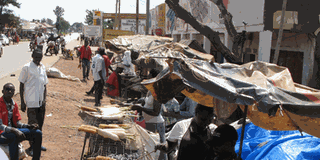Lyantonde vendors resist relocation

Vendors in Lyantonde town go about their business recently. PHOTO BY GERTRUDE MUTYABA
What you need to know:
- Defiant. They argue that eviction is intended to drive them out of business since they target travellers on the Masaka- Mbarara road.
LYANTONDE. After failing to secure a suitable alternative site, leaders in Lyantonde town are stuck with 200 vendors, who were ordered to vacate the roadside market.
The vendors, who sell mainly roasted beef, chicken, plantain and soft drinks on the Masaka-Mbarara highway in the heart of Lyantonde Town, have since defied the order.
They claim that the place is strategically located and they have operated from there for more than 20 years.
The eviction was proposed by traffic police in an attempt to curb accidents in the area.
Mr Alex Mwebaze, the chairperson of the vendors, said their main clients are travellers and relocating them to another place will drive them out of business.
“We started occupying this place in 1992 and no leader has ever stopped us from working here. We suspect that the police have ulterior motives to send us away from the town, which is wrong,” Mr Mwebaze said.
He explained that currently, every vendor earns an average of Shs20,000 as profits every day, which they fear may not be realised in case they are evicted from the area.
The vendors believe that putting humps in the area and erecting a permanent market structure will make more sense than relocating them to a place where they may lose business.
Mr Richard Bamwine, the officer-in-charge of traffic police in Lyantonde District, said despite the vendors’ concerns, the place where they currently operate, is prone to accidents.
He said in the last five years, a number of minor accidents have been registered near the roadside market and the police intention is to avert fatal accidents, which may claim vendors’ lives.
“As police, we can no longer control vendors who recklessly chase vehicles to sell their merchandise, thus we strongly propose that the town council authorities find a better and safer place for them,” Mr Bamwine said.
Mr Musoke Ssenkusu, another roadside vendor, claimed that evicting them from the roadside market would not solve the problem, but rather render them jobless.
“There are new people who come from different areas to vend various items here every day and when we are evicted, many will become jobless,” he said.
Mr Scorpion Mujib, a milk vendor in the area, advised the town council authorities to create a bylaw to guide the daily operations of the vendors instead of evicting them.
“The behaviour of some of our colleagues is not good and we call upon authorities to intervene so that our jobs are not undermined by a few unruly individuals,” Mr Mujib said, adding “some vendors usually jump into customers’ vehicles to sell edibles, which is practically wrong.”
Mr Titus Kutosi, the Lyantonde Town Council health inspector, said relocating the vendors is necessary because they make the place filthy, which compromises sanitation in the area.
“The vendors’ sanitation is also at stake given the fact that there is only one toilet to serve more than one hundred people,” Mr Kutosi said.
The Lyantonde LC3 chairperson, Mr Mustapha Kalule, said the motion to relocate the vendors was tabled during one of the council sittings and discussed, but no alternative place for relocation was identified.
“We still need to keep those people around because we have not yet secured land where we can relocate them,” Mr Kalule said.
Lyantonde District chairperson Fred Muhangi said they are currently pushing for the elevation of Lyantonde town council to a municipality, which calls for restoring trade order in the area.


